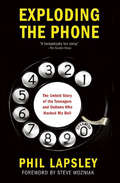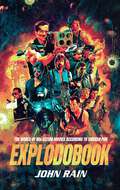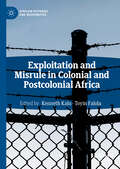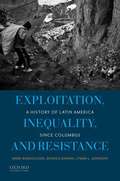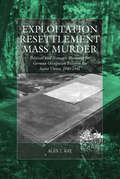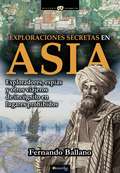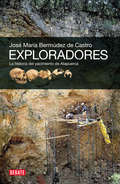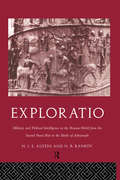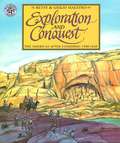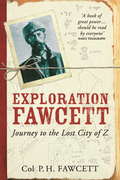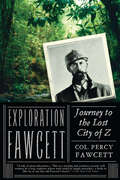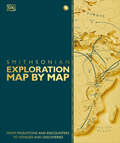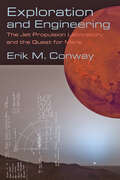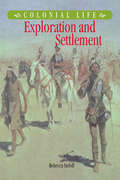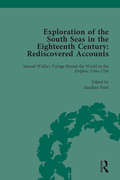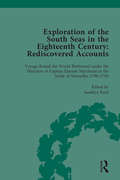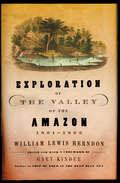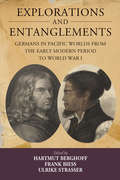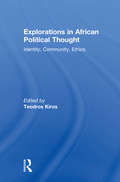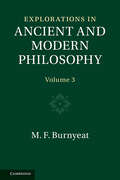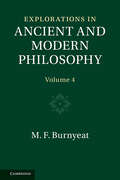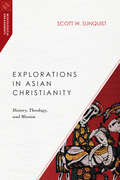- Table View
- List View
Exploding the Phone: The Untold Story of the Teenagers and Outlaws who Hacked Ma Bell
by Steve Wozniak Phil LapsleyBefore smartphones, back even before the Internet and personal computer, a misfit group of technophiles, blind teenagers, hippies, and outlaws figured out how to hack the world’s largest machine: the telephone system. Starting with Alexander Graham Bell’s revolutionary "harmonic telegraph,” by the middle of the twentieth century the phone system had grown into something extraordinary, a web of cutting-edge switching machines and human operators that linked together millions of people like never before. But the network had a billion-dollar flaw, and once people discovered it, things would never be the same.Exploding the Phone tells this story in full for the first time. It traces the birth of long-distance communication and the telephone, the rise of AT&T’s monopoly, the creation of the sophisticated machines that made it all work, and the discovery of Ma Bell’s Achilles’ heel. Phil Lapsley expertly weaves together the clandestine underground of "phone phreaks” who turned the network into their electronic playground, the mobsters who exploited its flaws to avoid the feds, the explosion of telephone hacking in the counterculture, and the war between the phreaks, the phone company, and the FBI.The product of extensive original research, Exploding the Phone is a ground-breaking, captivating book.
Explodobook: The World of 80s Action Movies According to Smersh Pod
by John RainThe 1980s. A time of fear: fear of the unknown, fear of your neighbours, fear of drugs, fear of sex, fear of strangers, fear of videos, and the very real fear that the world would end at any moment in an awful, and very sudden, nuclear attack. However, in those times of turmoil and worry, there was a comfort that soothed the mind, and acted as a quiet balm: action movies. Video shops were bursting at the seams with rampant gunfire, sex, drugs, rock, roll, cars on fire, people on fire, guns, bombs, and people dressed in army fatigues (and that was just the staff). Heroes were born shrouded in fire and violent revenge, they were not only armed with guns, but also red-hot quips, that served as a muscly arm around the shoulder, and a wink that everything was going to be okay. So thank you Arnold, Sylvester, Sigourney, Bruce, Eddie, Charles, Patrick, Mel, Chuck and everyone else that made it happen. You saved the world, in your own inimitable way. Join John Rain, the author of the critically-acclaimed Thunderbook: The World of Bond According to Smersh Pod, as he examines a choice selection of the greatest action movies from the decade when the explosion was king.
Exploitation and Misrule in Colonial and Postcolonial Africa (African Histories and Modernities)
by Toyin Falola Kenneth KaluThis book offers new perspectives on the history of exploitation in Africa by examining postcolonial misrule as a product of colonial exploitation. Political independence has not produced inclusive institutions, economic growth, or social stability for most Africans—it has merely transferred the benefits of exploitation from colonial Europe to a tiny African elite. Contributors investigate representations of colonial and postcolonial exploitation in literature and rhetoric, covering works from African writers such as Ngugi wa Thiong’o, Kwame Nkrumah, and Bessie Head. It then moves to case studies, drawing lines between colonial subjugation and present-day challenges through essays on Mobutu’s Zaire, Nigerian politics, the Italian colonial fascist system, and more. Together, these essays look towards how African states may transform their institutions and rupture lingering colonial legacies.
Exploitation, Inequality, and Resistance: A History of Latin America Since Columbus
by Lyman Johnson Mark Burkholder Monica Rankin<p>The words "exploitation," "inequality," and "resistance" bind together attitudes and actions that encapsulate much of Latin America's economic, social, and political history for more than half a millennium. In this compelling text, authors Mark A. Burkholder, Lyman L. Johnson, and Monica A. Rankin tell the story of more than 500 years of Latin American history through the themes of exploitation, inequality, and resistance. <p>Some examples of exploitation and inequality include slavery and other labor systems, sexual and gender exploitation, an inequitable economic relationship with foreign countries, repressive political systems through dictatorship and military regimes, and an unequal diplomatic relationship with the United States and other powerful nations. Despite deeply entrenched systems of injustice, Latin Americans remain notable for their resilience. Active and passive resistance to oppression and discrimination still persist in the twenty-first century, with native revolts and slave flights, unionization, the emergence of the Latin American women's movement, black-market economies, the emergence of populism, and various forms of revolt and revolution. Exploitation, Inequality, and Resistance: A History of Latin America since Columbus emphasizes these themes and analyzes the ways in which earlier events continue to resonate today.</p>
Exploitation, Resettlement, Mass Murder
by Alex J. KayConvinced before the onset of Operation "Barbarossa" in June 1941 of both the ease, with which the Red Army would be defeated and the likelihood that the Soviet Union would collapse, the Nazi regime envisaged a radical and far-reaching occupation policy which would result in the political, economic and racial reorganization of the occupied Soviet territories and bring about the deaths of 'x million people' through a conscious policy of starvation. This study traces the step-by-step development of high-level planning for the occupation policy in the Soviet territories over a twelve-month period and establishes the extent to which the various political and economic plans were compatible.
Exploiting Erasmus
by Gregory D. DoddsDesiderius Erasmus' humanist works were influential throughout Europe, in various areas of thought including theology, education, philology, and political theory. Exploiting Erasmus examines the legacy of Erasmus in England from the mid-sixteenth century to the overthrow of James II in 1688 and studies the various ways in which his works were received, manipulated, and used in religious controversies that threatened both church and state. In viewing movements and events such as the rise of anti-Calvinism, the religious politics leading to the English civil war, and the emergence of the Latitudinarians during the Restoration, Gregory D. Dodds provides a fascinating account not only of the reception and effects of Erasmus' works, but also of the early history of English Protestantism. Exploiting Erasmus offers a critical new angle for rethinking the theology and rhetoric of the time. It is a remarkable study of Erasmus' influence on issues of conformity, tolerance, war, and peace.
Exploraciones secretas en Asia (Historia Incógnita)
by Fernando BallanoAcompañe a los exploradores, espías y aventureros que recorrieron los lugares prohibidos de Asia (La Meca, Arabia, Asia Central, Tibet, Afganistán y China) en misión secreta o por desafío personal, y viva sus fascinantes e increíbles aventuras. Exploraciones secretas en Asia le llevará por ciudades, regiones y países de este continente que, en algunos momentos estaban prohibidos a los extranjeros, a todos los occidentales o a determinadas nacionalidades. Podrá acompañar a los que lo intentaron disfrazándose y fingiendo otros orígenes para poder recorrer de incógnito lugares vedados como La Meca, Oriente Próximo, Asia Central, Tíbet, algunas regiones de Afganistán y China. Junto a viajeros o aventureros, más o menos conocidos, como Richard Francis Burton o Lawrence de Arabia, conoceremos a muchos otros que han pasado desapercibidos y no han tenido el homenaje que merecen Argumentos de venta -Esta obra traslada al lector a países, regiones y ciudades prohibidas como Afganistán, El Tibet o China, de la mano de aventureros que consiguieron entrar de incógnito. Ofrece un exhaustivo recorrido geográfico-histórico sobre exploraciones en lugares prohibidos en continente africano. - Trata sobre viajeros y exploradores, como Richard Francis Burton o Lawrence de Arabia, cuyas historias y viajes son poco conocidos y poco divulgados. Muchos de los viajes contenidos en esta obra aparecen por primera vez publicados en castellano. - La aventura de cada viajero está acompañada de un mapa con el itinerario realizado y abundantes ilustraciones del recorrido. - Este título conjuga divulgación y aventura dando forma a un libro apasionante que hará las delicias de los lectores.
Exploradores: La historia del yacimiento de Atapuerca
by José María Bermúdez de CastroUn viaje en el tiempo a través de la historia del yacimiento de Atapuerca. En 1994 un grupo de investigadores españoles encontró los restos del primer europeo en la sierra de Atapuerca: fue un descubrimiento revolucionario que cambiaría el paradigma sobre la colonización prehistórica de Europa y que situaría a nuestro país en un lugar predominante en los estudios de la evolución humana. José María Bermúdez de Castro nos cuenta las vivencias de los investigadores y las vicisitudes que han llevado a la sierra de Atapuerca a convertirse en uno de los yacimientos más importantes de Eurasia. Exploradores es un viaje en el tiempo a través de la historia del yacimiento y de sus descubrimientos, desde hace un millón y medio de años hasta hoy, una historia de nuestros orígenes que consi - gue responder a dos de las preguntas fundamentales: ¿quiénes somos? y ¿de dónde venimos?
Exploratio: Military & Political Intelligence in the Roman World from the Second Punic War to the Battle of Adrianople
by N. J. Austin N. B. RankovExploratio is the first ever survey of Roman military and civil intelligence. The authors examine in detail the operation and gradual development of Roman intelligence-gathering from shaky beginnings to a high level of excellence. They identify who gathered it, and for whom.This study shows the effects of intelligence on policy formation at various levels from the purely local through to the global. The consequences of various instances of the mishandling of information are uncovered. Austin and Rankov also demonstrate that intelligence gathering was not necessarily directed from Rome, but had for practical reasons to be carried out and processed on the frontiers themselves.Exploratio is important reading for all students and teachers of Roman history. It will also appeal to those with a general interest in military or diplomatic history.
Exploration And Conquest: 1500-1620
by Giulio Maestro Betsy MaestroChristopher Columbus was not the first to discover the Americas, but his voyages led to European exploration of the New World. Rich in resources and natural beauty, the Americas were irresistible to gold-hungry conquistadors. The newcomers gave little thought to those who had called the lands their home, and exploration soon came to signify conquest. The New World -- and the lives of its inhabitants -- would be changed forever.
Exploration Fawcett
by Col. Percy FawcettThe life of Colonel Fawcett is now the subject of the major motion picture The Lost City of Z.The disappearance of Colonel Fawcett in the Matto Grosso remains one of the great unsolved mysteries. In 1925, Fawcett was convinced that he had discovered the location of a lost city; he had set out with two companions, one of whom was his eldest son, to destination 'Z', never to be heard of again. His younger son, Brian Fawcett, has compiled this book from letters and records left by his father, whose last written words to his wife were: 'You need have no fear of any failure . . .' This is the thrilling and mysterious account of Fawcett's ten years of travels in deadly jungles and forests in search of a secret city.
Exploration Fawcett: Journey to the Lost City of Z
by Percy FawcettThis is the true story of the real Colonel Fawcett and his mysterious disappearance in the Amazon jungle, which is now considered one of the greatest mysteries of the twentieth century. The mystic and legendary British explorer Colonel Percy Harrison Fawcett, whose life was the inspiration for the bestselling book The Lost City of Z and an upcoming movie starring Brad Pitt, disappeared in the unknown and unexplored territory of Brazil's Mato Grosso in 1925. For ten years he had wandered the forests and death-filled rivers in search of a fabled lost city. Finally, convinced that he had discovered the location, he set out for the last time with two companions, one of whom was his eldest son, to destination "Z," never to be heard from again. This thrilling and mysterious account of Fawcett's ten years of travels in deadly jungles and forests in search of a secret city was compiled by his younger son from manuscripts, letters, and logbooks. What happened to him after remains a mystery.
Exploration Map by Map: From Migrations and Encounters to Voyages and Discoveries (DK History Map by Map)
by DKDiscover the epic history of human exploration and migration, and the stories of fearless pioneers the world over, with this stunning tour of history - map by map. Charting everything from the movement of early Homo species out of Africa some 1.8 million years ago to the astonishing voyages of Polynesian sailors across the Pacific from 4,000 BCE, and from the California Gold Rush to the Race for Space, entries explain the movements of people and cultures who set off into the unknown - in search of adventure or a better life. Specially commissioned maps show the key driving factors of each journey, and why certain routes were chosen over others - whether due to climate, terrain, or territory - while stunning contemporary examples offer fascinating insights into the unique world-views and political motivations of the people who commissioned them, and the cartographers who created them. The voyages of history’s greatest explorers - from Zheng He to Ibn Battuta and Marco Polo - are brought to vivid life with accompanying photos, illustrations, and original artefacts, along with recent missions to chart the depths of the oceans and the surface of Mars. And entries also explore the experiences of established Indigenous groups and the impact of settler populations. Packed with fascinating detail and bursting with lavish illustrations, Exploration: Map by Map is a must-have title for anyone who loves maps, history, or the pioneering spirit.
Exploration and Engineering: The Jet Propulsion Laboratory and the Quest for Mars (New Series in NASA History)
by Erik M. ConwayGetting to Mars required engineering genius, scientific strategy, and the drive to persevere in the face of failure.Although the Jet Propulsion Laboratory in Pasadena, California, has become synonymous with the United States’ planetary exploration during the past half century, its most recent focus has been on Mars. Beginning in the 1990s and continuing through the Mars Phoenix mission of 2007, JPL led the way in engineering an impressive, rapidly evolving succession of Mars orbiters and landers, including roving robotic vehicles whose successful deployment onto the Martian surface posed some of the most complicated technical problems in space flight history.In Exploration and Engineering, Erik M. Conway reveals how JPL engineers’ creative technological feats led to major breakthroughs in Mars exploration. He takes readers into the heart of the lab’s problem-solving approach and management structure, where talented scientists grappled with technical challenges while also coping, not always successfully, with funding shortfalls, unrealistic schedules, and managerial turmoil.Conway, JPL’s historian, offers an insider’s perspective into the changing goals of Mars exploration, the ways in which sophisticated computer simulations drove the design process, and the remarkable evolution of landing technologies over a thirty-year period.
Exploration and Settlement
by Rebecca StefoffFirst Published in 2015. Routledge is an imprint of Taylor & Francis, an Informa company.
Exploration of the South Seas in the Eighteenth Century: Samuel Wallis’s Voyage Round the World in the Dolphin 1766-1768 (Routledge Historical Resources)
by Sandhya PatelThe publication of key voyaging manuscripts has contributed to the flourishing of enduring and prolific worldwide scholarship across numerous fields. These navigators and their texts were instrumental in spurring on further exploration, annexation and ultimately colonisation of the pacific territories in the space of only a few decades. This series will present new sources and primary texts in English, paving the way for postcolonial critical approaches in which the reporting, writing, rewriting and translating of Empire and the ‘Other’ takes precedence over the safeguarding of master narratives. Each of the volumes contains an introduction that sets out the context in which these voyages took place and extensive annotations clarify and explain the original texts. The first volume makes available Samuel Wallis’ logs of the Dolphin’s voyage 1766-68 in their original form for the first time. Captain Samuel Wallis was the first Englishman to come across the Tuamotus and the Society Isles in the South Pacific, specifically Tahiti. His writings predate the available textual sources by Louis-Antoine de Bougainville, the logs of the Spanish voyages and James Cook — whose text Wallis’ prefigures. The three logs attest to the very first encounter between Europeans and Tahitians, but until now comparatively little research has been conducted on the more elaborate second volume and none on the first. The Polynesian archipelagos grew into objects of discourse over the years and Wallis' logs may very well be located at the heart of these evocative constructs.
Exploration of the South Seas in the Eighteenth Century: Voyage Round the World Performed under the Direction of Captain Etienne Marchand in the Solide of Marseilles 1790-1792 (Routledge Historical Resources)
by Sandhya PatelThe publication of key voyaging manuscripts has contributed to the flourishing of enduring and prolific worldwide scholarship across numerous fields. These navigators and their texts were instrumental in spurring on further exploration, annexation and ultimately colonisation of the pacific territories in the space of only a few decades. This series will present new sources and primary texts in English, paving the way for postcolonial critical approaches in which the reporting, writing, rewriting and translating of Empire and the ‘Other’ takes precedence over the safeguarding of master narratives. Each of the volumes contains an introduction that sets out the context in which these voyages took place and extensive annotations clarify and explain the original texts. The translated accounts of voyages undertaken by foreign vessels abounded in an era when they encouraged not only competitive geopolitical initiatives but also commercial enterprises throughout Europe, resulting in a voluminous textual corpus. However, French merchant-seaman Etienne Marchand’s journal of his voyage round the world in 1790-1792, encompassing an important visit to the Marquesas Archipelago during his first crossing of the Pacific, remained unpublished until 2005 and has only now been made available in English. The second volume of this series comprises an annotated translation in English of this document.
Exploration of the Valley of the Amazon, 1851–1852
by Gary Kinder William Lewis HerndonIn 1857, Captain William Lewis Herndon sacrificed his life trying to save 600 passengers and crew when his ship foundered in a hurricane off the Carolina coast. Memorialized in Gary Kinder's bestselling book Ship of Gold in the Deep Blue Sea, Herndon, with this final courageous act, epitomized a lifetime of heroism. Seven years earlier, the secretary of the Navy had appointed Herndon to lead the first American expedition into the Amazon Valley. Herndon departed Lima, Peru, on May 20, 1851, and arrived at Para, Brazil, nearly a year later, traveling 4,000 miles by foot, mule, canoe, and small boat. He cataloged the scientific and commercial observations requested by Congress, but he filed his report as a narrative, creating an intimate portrait of an exotic land before the outside world rushed in. Herndon's report so far surpassed his superiors' expectations that instead of printing the obligatory few hundred copies for Congress, the secretary of the Navy ordered 10,000 copies in the first print run; three months later, he ordered 20,000 more. Herndon described his adventures with such insight, such compassion and wit, and such literary grace that he came to symbolize the new spirit of exploration and discovery sweeping mid-nineteenth-century America. For the next hundred years, Herndon's report languished out of print before being revived briefly in 1951. Now, for the first time in nearly fifty years, Gary Kinder and Grove Press bring to readers one of the greatest chronicles of travel and exploration ever written.
Explorations and Entanglements: Germans in Pacific Worlds from the Early Modern Period to World War I (Studies in German History #22)
by Hartmut Berghoff Ulrike Strasser Frank BiessTraditionally, Germany has been considered a minor player in Pacific history: its presence there was more limited than that of other European nations, and whereas its European rivals established themselves as imperial forces beginning in the early modern era, Germany did not seriously pursue colonialism until the nineteenth century. Yet thanks to recent advances in the field emphasizing transoceanic networks and cultural encounters, it is now possible to develop a more nuanced understanding of the history of Germans in the Pacific. The studies gathered here offer fascinating case studies of German missionary, commercial, scientific, and imperial activity against the backdrop of the Pacific’s overlapping cultural circuits and complex oceanic transits.
Explorations and Entanglements: Germans in Pacific Worlds from the Early Modern Period to World War I (Studies in German History #22)
by Ulrike Strasser Hartmut Berghoff, Frank BiessTraditionally, Germany has been considered a minor player in Pacific history: its presence there was more limited than that of other European nations, and whereas its European rivals established themselves as imperial forces beginning in the early modern era, Germany did not seriously pursue colonialism until the nineteenth century. Yet thanks to recent advances in the field emphasizing transoceanic networks and cultural encounters, it is now possible to develop a more nuanced understanding of the history of Germans in the Pacific. The studies gathered here offer fascinating research into German missionary, commercial, scientific, and imperial activity against the backdrop of the Pacific’s overlapping cultural circuits and complex oceanic transits.
Explorations in African Political Thought: Identity, Community, Ethics
by K. Anthony Appiah Teodros KirosThis rich collection brings together many of the leading authorities on African political philosophy to present a variety of perspectives on this rapidly growing field. They seek to show that African philosophy can serve African people as a moral activity guided by the principles of practical reason in addressing problems of the basic structures of social, political, and economic institutions.
Explorations in Ancient and Modern Philosophy
by M. F. BurnyeatM. F. Burnyeat taught for 14 years in the Philosophy Department of University College London, then for 18 years in the Classics Faculty at Cambridge, 12 of them as the Laurence Professor of Ancient Philosophy, before migrating to Oxford in 1996 to become a Senior Research Fellow in Philosophy at All Souls College. The studies, articles and reviews collected in these two volumes of Explorations in Ancient and Modern Philosophy were all written, and all but two published, before that decisive change. Whether designed for a scholarly audience or for a wider public, they range from the Presocratics to Augustine, from Descartes and Bishop Berkeley to Wittgenstein and G. E. Moore. Their subject-matter falls under four main headings: 'Logic and Dialectic' and 'Scepticism Ancient and Modern', which make up the first volume, with 'Knowledge' and 'Philosophy and the Good Life' contained in this, the second volume. The title 'Explorations' well expresses Burnyeat's ability to discover new aspects of familiar texts, new ways of solving old problems. In his hands the history of philosophy becomes itself a philosophical activity.
Explorations in Ancient and Modern Philosophy: Volume 3
by Myles BurnyeatMyles Burnyeat (1939–2019) was a major figure in the study of ancient Greek philosophy during the last decades of the twentieth century and the first of this. After teaching positions in London and Cambridge, where he became Laurence Professor, in 1996 he took up a Senior Research Fellowship at All Souls College, Oxford, from which he retired in 2006. In 2012 he published two volumes collecting essays dating from before the move to Oxford. Two new posthumously published volumes bring together essays from his years at All Souls and his retirement. The main body of Volume 3 presents studies written for a wide readership, first on Plato's Republic and then on the reading and interpretation of Plato in subsequent periods, particularly in nineteenth-century Britain. The volume also includes hitherto unpublished lectures, 'The Archaeology of Feeling', on the ancient origins of some key modern philosophical and psychological concepts.
Explorations in Ancient and Modern Philosophy: Volume 4
by Myles BurnyeatMyles Burnyeat (1939-2019) was a major figure in the study of ancient Greek philosophy during the last decades of the twentieth century and the first of this. After teaching positions in London and Cambridge, where he became Laurence Professor, in 1996 he took up a Senior Research Fellowship at All Souls College, Oxford, from which he retired in 2006. In 2012 he published two volumes collecting essays dating from before the move to Oxford. Two new posthumously published volumes bring together essays from his years at All Souls and his retirement. The essays in Volume 4 are addressed principally to scholars engaging first with fundamental issues in Platonic and Aristotelian metaphysics and epistemology and in Aristotle's philosophical psychology. Then follow studies tackling problems in interpreting the approaches to physics and cosmology taken by Plato and Aristotle, and in assessing the evidence for early Greek exercises in optics.
Explorations in Asian Christianity: History, Theology, and Mission (Missiological Engagements)
by Scott W. SunquistExplorations in Asian ChristianityEcumenism in AsiaThe cruciform nature of ChristianityA missiology of placeThe Christian view of timeGlobal migrationExplorations in Asian Christianity
